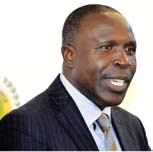Set for Take off – Kenya’s Agriculture Sector Ready for Increased Investments
 We are now asking for a broad group of partners in the public and private sector to join us in seizing the moment for Kenya. Together, we can build a coalition that can accumulate and allocate the right mix of investments that will ensure agriculture becomes a powerful engine for delivering economic opportunity and food security across Kenya.
We are now asking for a broad group of partners in the public and private sector to join us in seizing the moment for Kenya. Together, we can build a coalition that can accumulate and allocate the right mix of investments that will ensure agriculture becomes a powerful engine for delivering economic opportunity and food security across Kenya.
Our future fortunes are in the hands of our farmers and the food industry. Three out of every four Kenyans work in some aspect of agriculture. Food production and economic growth in agriculture is eleven times more effective at reducing poverty than growth in any other sector.
The importance of agriculture for Kenya and for all of Africa is now widely acknowledged and a new wave of support is rising in both the public and private sector, and among development partners and donors.
The prospect of a surge of investments for Kenyan farmers and local agribusinesses is raising expectations for the sector.
But why should anyone invest in Kenyan farms and local agriculture businesses? One answer is to be found in Kenya’s rapidly growing food retail sector. Driven by explosive demand among urban consumers, food purchases in the country are growing by an impressive 10 per cent per year and are expected to reach Sh1.8 trillion (US $17.6 billion) by 2020. In fact, demand is exceeding domestic supply and imports now account for about half of all domestic purchases of staples like rice, wheat and soybeans.
And with the right mix of investments, Kenyan farmers could own 100 per cent of that market. For example, greater public investments in crop research and private investments in local production of high yielding and locally adapted seeds and farm inputs could help rapidly narrow the pervasive “yield gap” on Kenyan farms. Today, most farmers harvest about two tons of maize per hectare when their counterparts elsewhere in the world get six, and about a half ton of beans per hectare when they could be getting 10 times that amount.
Meanwhile investments in better storage options, particularly refrigerated facilities, and transportation infrastructure can help link farmers to the markets and justify expenditures and loans for high-yield crop varieties and quality inputs.
In addition, investments can take advantage of many positive developments in the Kenyan agriculture sector. For example, over the last 15 years, yields of bananas, mangoes, and potatoes have more than doubled, making them among the most valuable crops locally and opening up business opportunities in both domestic and export markets. There is already a new public/private partnership dedicated to constructing cold storage facilities in Kenya and elsewhere in East Africa that will capitalize on the potential of rising potato production by connecting millions of smallholder farms to produce markets.
Our agriculture sector also is attracting investor interest because Kenyans are increasingly recognized around the world as intensely entrepreneurial people, who naturally gravitate toward innovation. For example, Safaricom’s MPesa money transfer system is more efficient and more widely used than consumer electronic payment systems in the United States and Europe. Many people rightly believe we can bring that same kind of innovative thinking to agriculture.
But effectively channelling the new resources now becoming available for Kenyan agriculture requires achieving consensus on a detailed investment roadmap. It must inspire confidence in the public and private sector, and in donor countries and international institutions, that generous commitments to agriculture will generate the progress Kenyans need and deserve.
The agriculture investment forum went a long way toward finalizing a new National Agriculture Investment Plan for Kenya that can attract widespread support. Many of us involved in the meeting felt it embraced the “seize the moment” theme of last year’s AGRAF by infusing Kenya’s agriculture agenda with a sense of purpose and urgency. We are now asking for a broad group of partners in the public and private sector to join us in seizing the moment for Kenya. Together, we can build a coalition that can accumulate and allocate the right mix of investments that will ensure agriculture becomes a powerful engine for delivering economic opportunity and food security across Kenya.
Hon. Willy Bett is the Cabinet Secretary in the Ministry of Agriculture, Livestock and Fisheries in Kenya.